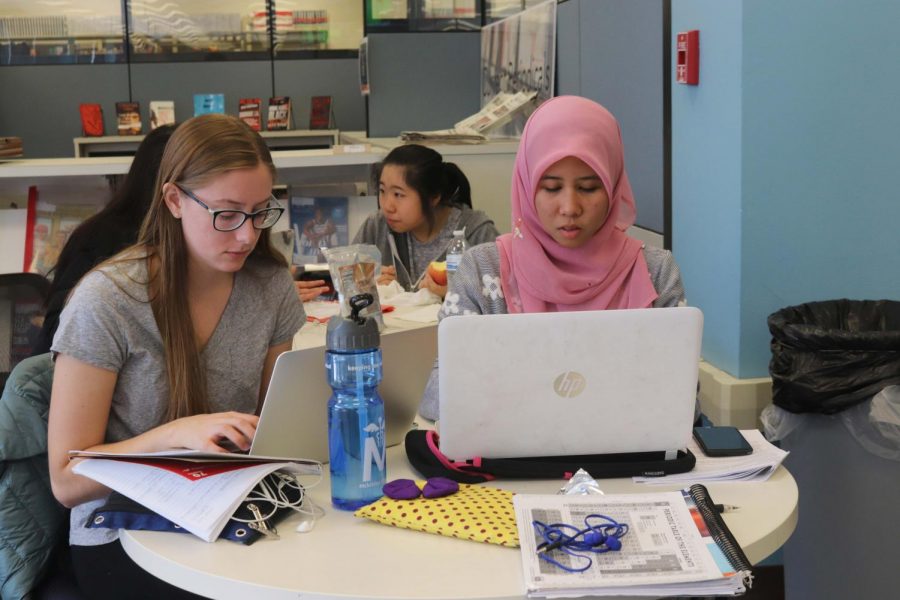Learn to view collaboration as a benefit
Sophomores Eva Bucke and Hazirah Muhamad work on a project together at the Undergraduate Library. Group projects can be beneficial because they allow students to learn how to work together.
July 17, 2018
You’re sitting in your small, claustrophobic desk, sweat gathering on your palms. This is the class you’ve been worried about the most all semester, and it’s finals week. Your professor just told you he’s about to assign the project that represents the greatest percent of your final grade.
Then the most dreaded words come out of his lips: “This is a group project.” Your stomach plummets.
Most people are deathly afraid of group projects, and rightfully so. It is not easy to get to know several people you may never have spoken to before, who are probably all very different from you, and collaborate with them on something that will affect your class grade. Especially if you’re the type that usually gets pinned down to do most of the work for the group.
But this negative mindset about collaborative projects will ultimately prove very detrimental. One of the most important things you will learn in college is how crucial networking is to professional success, and it all begins with group projects just like this one.
A 2017 study of college students led by the University of Washington found group work is beneficial to one’s academic success, in addition to bolstering their retention of information.
Get The Daily Illini in your inbox!
Researchers compared survey responses and test scores from two work-effort styles: single-group and “jigsaw,” in which groups were varied over time and students had to reteach items they learned to different group members.
The results found not only did students who felt comfortable working in their groups perform better, but those who re-taught the information multiple times did even better. Investing in collaboration and learning how to teach others in a group setting resulted in better retention of information for them.
Learning to thrive in collaborative work efforts will fuel your future success. Employers are increasingly viewing teamwork skills as one of the most critical attributes for a potential employee to have. It is rare to leave an interview without having been asked about an example of a time where you employed teamwork well.
Teamwork also parallels an improvement of other necessary skills, like time management. It allows you the opportunity to delegate tasks and make sure everyone’s workload is appropriate. Responsibility is one of the hardest things to master, but group projects challenge and develop it.
In group work, a student is responsible for both their own success and the success of the entire group. This requires them to think at a higher level than that of the individual; they must recognize the specific strengths of each diverse group member and use them in a way that benefits the group.
In this way, a team member learns how to balance multiple responsibilities and deal with conflict. For example, if one group member falls short in contributing to the effort, other group members must learn how to solve the problem in an efficient and professional way.
Once you get an internship or job, you will be thrown in an environment where you will have to work with many different people. You may love some of them, and you may find it very difficult to get along with others. But keeping your viewpoint positive and leveraging your leadership in a way that keeps everyone included and committed, will help set you apart from your peers.
Not everyone will thrive in a group setting, but doing the best you can and remembering the positive impacts of group work will help you overcome potential difficulty. Being able to recognize the diverse skills every group member brings to the table, being open-minded and successful in solving problems and developing strong leadership skills are just some of many benefits that group work can give to you.
So, wipe that sweat off your hands and don’t dread the group project. Instead, get excited for any chance at collaboration that college throws at you. Because who knows? It might just land you your dream job one day.
Ella is a senior in LAS.







